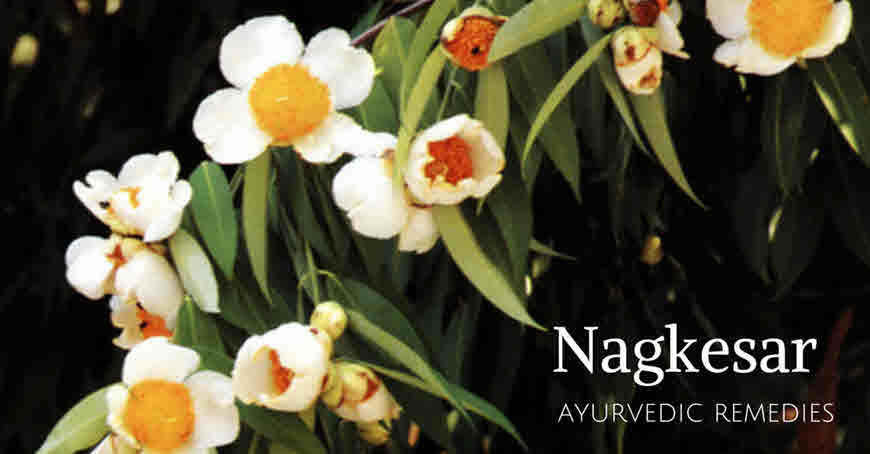Mesua is a beautiful evergreen large medicinal tree that is used in Ayurveda, Siddha and Unani system of medicine for the treatment of a variety of diseases. It is grown as ornamental tree in parks and on roadsides. It is known as Nagakesara (Ayurveda), Sirunagappo (Siddha) and Naarmushk (Unani). Mesua is found in tropical regions of Cambodia, Malaysia, Myanmar, Philippines, Singapore, Sri Lanka, Thailand, Vietnam and India. This tree is also known as Iron wood tree because of its heavy and very hard wood which is used for making heavy constructions, flooring and furniture. Mesua seed kernels contain reddish or dark brown oil. This oil tastes bitter and is not suitable for cooking. The stamens of flower are known as kesar. For the medicinal purpose mainly the flowers and stamens are used.

General Information
- Latin name- Mesua ferrea Linn. Synonym- M. nagassarium (Burm. f.) Kosterm.
- Family- Clusiaceae
- Vernacular Names
- SANSKRIT: Kesara, Nagapushpa, Naga, Hema, Gajakesara
- ASSAMESE: Negeshvar, Nahar
- BENGALI: Nageshvara, Nagesar
- ENGLISH: Cobras Saffron, Ceylon ironwod, Indian rose chestnut, Iron wood tree
- GUJRATI: Nagkesara, Sachunagkeshara, Nagchampa, Pilunagkesar, Tamranagkesar
- HINDI: Nagkesara, Pila Nagkesara, Nageswar
- KANNADA: Nagsampige, Nagakesari
- MALAYALAM: Nangaa, Nauga, Peri, Veluthapala, Nagppu, Nagappovu
- MARATHI: Nagkesara
- ORIYA: Nageswar
- PUNJABI: Nageswar
- TAMIL: Naugu, Naugaliral, Nagachampakam, Sirunagappu
- TELUGU: Nagachampakamu
- URDU: Narmushk, Nagkesar
- PHILIPPINES: kaliuas
- MALAYSIA: lengapus, penaga, penaga lilin
Medicinal parts: Bark, Leaf, Flower, Stamen
Mesua Tree description
Medium to large evergreen tree with short trunk; dark-red heartwood; Leaves are coriaceous and lanceolate; upper side shining and lower covered wits; a white waxy powder; Flowers fragrant white, large and solitary or in clusters; fruits ovoid with persistent calyx; Seeds 1-4, shining, dark brown with oily and fleshy cotyledons; Mesua flowers in February-April and fruiting occurs in September-October.
Distribution in India
Nagkesar is found in the mountains of Eastern Himalayas, East Bengal, Assam, Eastern and Western Ghats.
Ayurvedic Properties of Mesua ferrea (Nagkesar) Stamen
- Mesua ferrea (Nagkesar) is used in Ayurveda for time immemorial. The dried stamens are used in bleeding disorders, gout and diseases of the urinary bladder. The dried stamens are referred as Kesar.
- Rasa (Taste): Tikta/Bitter, Katu (pungent) kashaya/Astringent
- Guna (Characteristics): Laghu/Light, Ruksha/Dry
- Virya (Potency): Ushna/Hot
- Vipaka (Post Digestive Effects): Katu/Pungent
- Constituents of Stamen- Essential oil and Oleo-resin.
Ayurvedic medicines containing Mesua/Nagkesara: Brahma Rasayana, Chyawanprash, Chandanbalakshadi Taila, Kumariasava, Nagkesaradi churna
The dosage of Mesua ferrea (Nagkesar) Stamen/Kesar: 1-3 g. of the drug in powder form.
Medicinal uses of Nagkesar
Various parts of Mesua tree are used for treating a variety of ailments. Its flowers has an astringent/constricts tissues, anti-inflammatory and digestion improving properties. The flowers are beneficial in cough, bleeding piles and in abnormal bleeding from the womb. The oil obtained from flower’s stamen has antibacterial and anti-fungal properties. The flower buds are antidysenteric and used to treat the same.
Every medicinal plant exhibits different therapeutic value due to the presence of different phytochemicals. In Mesua tree, various parts of the tree show haemostatic property which means it acts as agent to arrest bleeding. Due to this property it is used in the treatment of bleeding piles and abnormal bleeding from uterus.
In Bihar, for cleaning uterus after delivery, Nagkesar powder is mixed with Methi seeds, Vijaysar seeds and tejpatta. This is given two times a day with rice water or cow’s milk for five days. Tribal of Tripura, take a spoonful of its flower paste mixed with honey twice daily in bleeding piles till the piles is cured.
Nagkesar shows abortifacient activity and must not be used in pregnancy.
Bleeding piles
- The dried flowers are ground to make very fine powder. This is given in a dose of 1/4 teaspoon with one cup hot water.
- Topical application in bleeding piles, burning of the feet
- The dried flower powder is mixed with ghee and applied at affected body part.
Cold
- In cold the leaves are heated and applied on chest area.
- In severe cold, the leaves poultice is applied on head.
Gastric troubles
- Ripe and unripe fruits are given for gastric troubles.
- Scabies, wounds, skin diseases
- The oil obtained from seeds are used externally on the affected areas.
Rheumatism
The seed oil is applied on the affected joints.
Other Uses of Mesua
Mesua tree is a non-toxic plant. Its ripe fruits, flowers and leaves are edible. In Thailand, the flowers are eaten.
Mesua heartwood is very strong and used for constructing columns, beams, flooring and furniture. The seeds are edible and can be used as feed for poultry and animals. The seeds are a good source of energy and protein. The flowers are used for stuffing pillows, dyeing purpose and in many cosmetic products.
Hello,
Can this herb be used for treating ulcerative colitis? Does it stop bleeding in colitis?
What form is this herb available for medicinal use? Any company manufacturing this herb in tablet or liquid form?